
On 27 October, the Israeli military entered Gaza, ostensibly to eliminate Hamas. Since then, it has been indiscriminately killing children, women, and men alike, with no evidence that any of them were associated with Hamas. As the invasion enters its sixth month, Israel is poised to enter Rafah, US protestations notwithstanding.
Instead of forcing Israel to stop the onslaught, the US is supplying F-35 fighter jets and 2,000 lb bombs to Israel. By contrast, South Africa, with a long history of struggles against apartheid, has taken Israel to the International Court of Justice, twice. Firstly, to charge it with genocide. Secondly, to charge it with illegally occupying the West Bank and Gaza since 1967. Notably, it is not a Muslim country, nor is it contiguous to Israel.
What are the Muslim countries doing to stop Israel? Nothing. While the two billion people living in those countries are extremely upset and angry, their governments are taking no concrete actions to stop Netanyahu’s rampage. Several countries have banned protest rallies to support the Palestinians, nor fly the Palestinian flag or even wear a badge.
Turkey, whose president is making the loudest noise, is one of Israel’s major trading partners. It is Israel’s third largest importer, after China and the US. Iron and steel are one of Turkey’s major exports to Israel. Turkey is also the seventh larger buyer of Israeli products. If Erdogan was not duplicitous, he would cut off diplomatic ties with Tel Aviv and impose sanctions. Until the first world war put an end to the Ottoman Empire, Turkey reigned over the areas that now constitute Israel, Palestine, Syria and Lebanon. Turkey was the first Muslim country to recognise Israel, just a year after its formation in 1948.
Lebanon, Jordan, Syria, and Egypt share borders with Israel. The northern portion of Saudi Arabia is close to Israel. None of these countries are taking any actions that would put political and economic pressure on Israel.
On 11 November, to save face, the Saudi royals convened a summit of more than 50 Muslim heads of state in Riyadh to discuss Gaza. The meeting ended without any concrete steps to take to end the rampage. A proposal by Iran to impose economic and oil sanctions on Israel and to ban Israeli aircraft from using Arab airspace was shot down by Saudi Arabia, conspiring with UAE, Bahrain, Sudan, Mauritania, Djibouti, Jordan and Egypt.
Mahathir Mohamad, who ruled Malaysia twice as prime minister, was appalled. He said that Muslim and Arab leaders had been stripped of their dignity by Israel. They had fallen for the traps laid out by their Western allies who “continue to humour them but never take them seriously.”
The Trump Administration brokered the Abraham Accords, seeking to tie a knot between Israel and key Arab states while bypassing the plight of the Palestinians. The Arab regimes stepped back from their long-standing pledge not to recognize Israel unless (a) it withdrew from the territories it had seized in 1967 and (b) allowed a Palestinian state to come into being. It was the ultimate betrayal of the Palestinians by their Arab brethren.
After signing the Abraham Accords, Israel established diplomatic relations with Bahrain, UAE, Sudan and Morocco, supplementing the diplomatic relations it already had with Egypt and Jordan, both of which were decisively defeated in the 1967 War.
Additionally, several Arab states maintain unofficial ties with Israel. Netanyahu, who has ruled Israel for 16 years, longer than any other prime minister, has often bragged about the existence of such ties.
MBS, the effective Saudi head of state, paid a secret visit to Israel in 2017. A year later, the Kingdom purchased spy equipment from Israel in a deal brokered by the US. Publicly, MBS has said that Israelis are entitled to live peacefully in their own land.
The UAE is using an Israeli firm to spy on dissidents, turning their phones into surveillance devices. The same firm was used to surveil and assassinate Saudi dissident Jama Khashoggi.
Netanyahu played up the threat that Iran poses to the region when he visited Oman. The same threat was brought up when his minister of culture visited Abu Dhabi.
Closer to home, Israel has remarkably close ties with Egypt. In coordination with Egyptian authorities, Israel regularly conducts airstrikes in northern Sinai against Egyptian dissidents. It also exports natural gas to Egypt and signed a $15 billion deal in 2018.
Israel needs Jordan as a security buffer and Jordan needs Israel’s water to maintain economic stability. Israel considers Jordan a strategic partner and vice versa.
Israel has close ties with Morocco. It has bought military equipment from Israel. For years, both countries have maintained liaison offices in the other to further economic ties.
Bahrain and Israel share a paranoia of Iran. In a similar vein, Sudan and Israel have begun cooperating with hopes of establishing diplomatic ties.
What are the Arabs afraid of? Israel is not going to attack them militarily if they cut off diplomatic ties and impose sanctions. Even if the Arab states develop the muster to threaten Israel militarily, it’s highly unlikely that Israel would use nuclear weapons on them. The fallout would engulf Israel as much as any Arab state.
If their economic sanctions on Israel do not suffice, the Arab countries could put political pressure on the US to stop supporting Israel militarily or risk facing sanctions.
Why have not done so? They fear that by supporting the Palestinians in Gaza, they would create conditions which would bring about the return of the Muslim Brotherhood and empower it to exert influence in other Arab countries. Most Arab regimes are governed by tinpot dictators who stay in power at the mercy of the US. That is why Anthony Blinken is a frequent visitor.
The plight of the Palestinians can be summed up with this phrase: “With friends like these, who needs enemies?”

